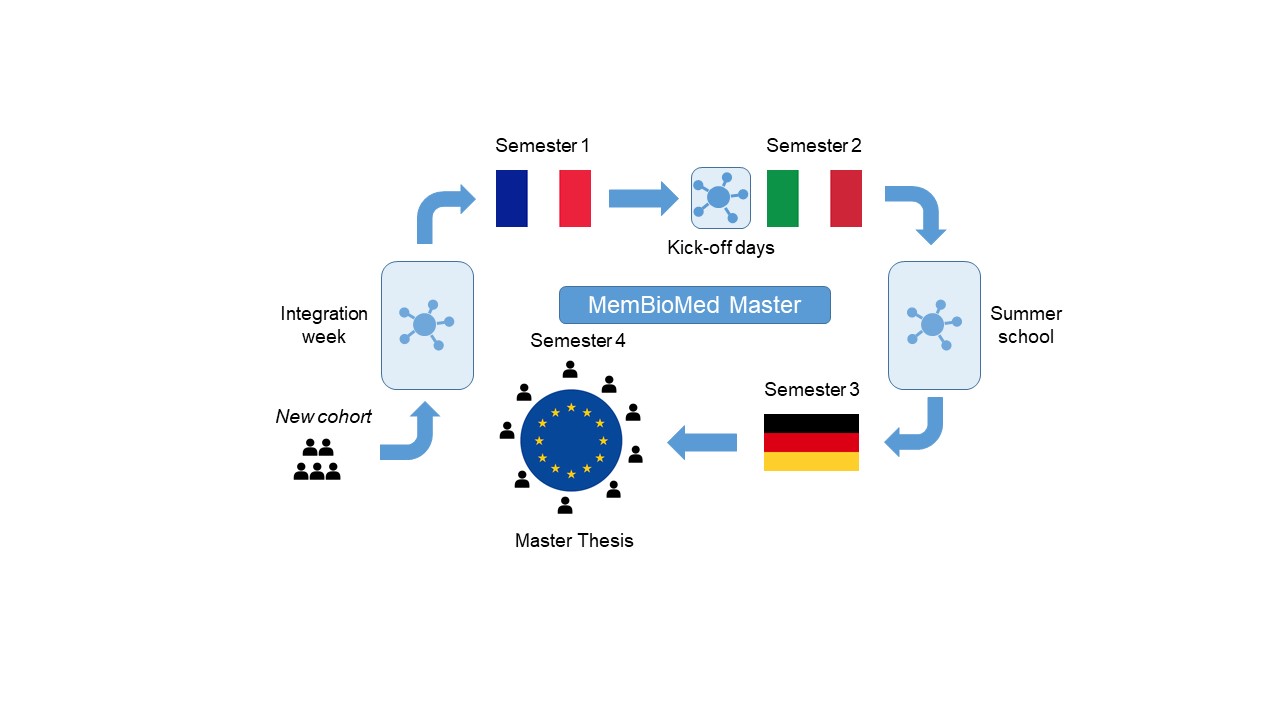ERASMUS MUNDUS JOINT MASTER : Membiomed
Overall Programme
MemBioMed’s two-year Master’s programme is designed to provide a top quality and highly integrated qualification with unique multi-discplinary research-oriented training in membrane biology. The academic programme is based on three existing, successful national master programmes in UniCa (France), UniGe (Italy) and UOS (Germany). Each partner's master degree is fully recognized and accredited by national accreditation agencies, according to national procedures. The EMJM has been designed to ensure academic continuity and complementarity with first cycle programmes and to ensure access to PhD opportunities as well as job opportunities in the private sector, throughout the consortium, within the EHEA and worldwide.
The curriculum is based on teaching modules already certified in the partner's local master´s programmes, namely:
- Master in Life Sciences (Université Côte d’Azur, UniCA)
- Master of Medical, Pharmaceutical and Biotechnology (University of Genova, UniGe)
- Master of Biology – From Molecules to Organisms (Osnabrück University, UOS)
Figure 4 : Overall programme

The MemBioMed programme is a 2-year Master's programme, consisting of 4 semesters. Semesters 1, 2 and 3 are completed successively at the three partner universities. During these 3 semesters, MemBioMed students are part of local Masters programmes for the most relevant teaching modules that have been chosen. In addition, specially tailored modules have been developed for the MemBioMed programme in each University. Theoretical courses are complemented by practical training in research laboratories or at one of our private partners in the form of lab rotations (=6 weeks internships) and research projects (=8 weeks internships) during each semester enabling students to gain experience in a variety of research topics and methodologies. Semester 4 consists exclusively of the Master project and the writing of the Master's thesis, which will be prepared in one of the partner institution's research laboratories or industrial associated structures.
Mobilities
All students will move at least twice during the master programme to study in the three different European countries of the MemBioMed programme for a minimum of one semester each, with the final semester in any country. Efficient transitions will be ensured by intense onboarding activities at the beginning of each of the first three semesters (Integration week, Kick-off days, Summer School). Mobility is also planned for the scientific and administrative staff involved in the programme and for lecturers from the three universities, as well as external experts selected for their outstanding teaching and scientific skills.
Awarded Degrees
The first intake graduates receive a multiple Master’s degree from UniCA, UniGe, and UOS, with each degree recognized by all partner institutions. A Diploma Supplement in English-and along the guidelines adopted for the EHEA accompanies the Master’s degree, providing a comprehensive overview of the MemBioMed joint programme.

